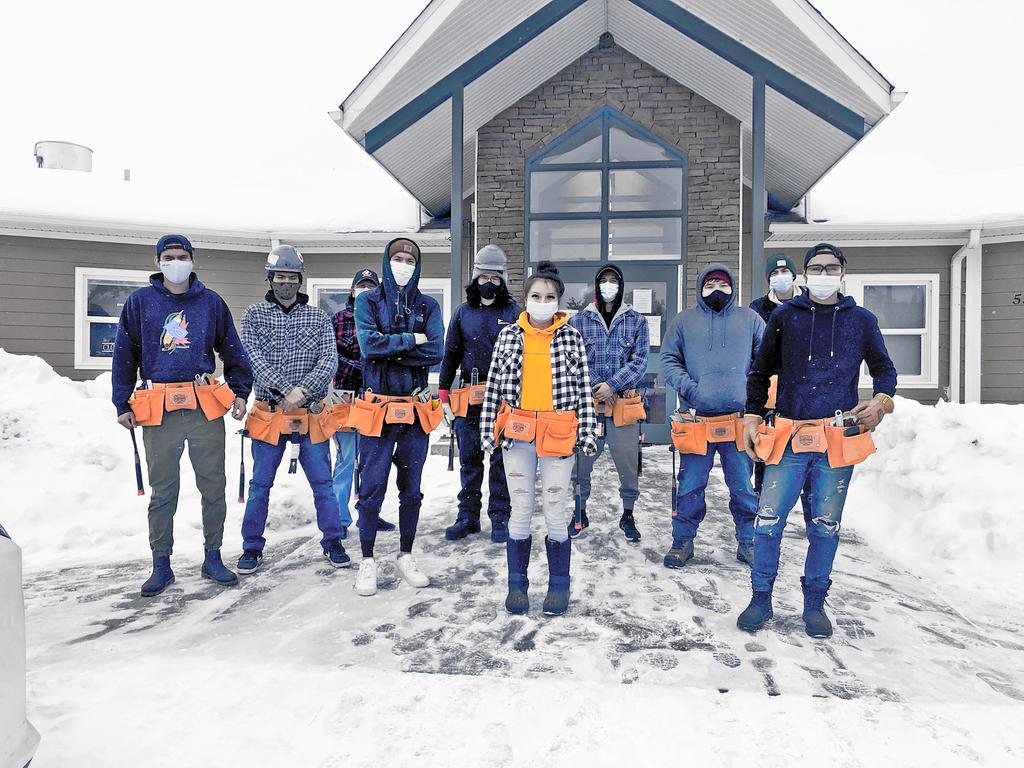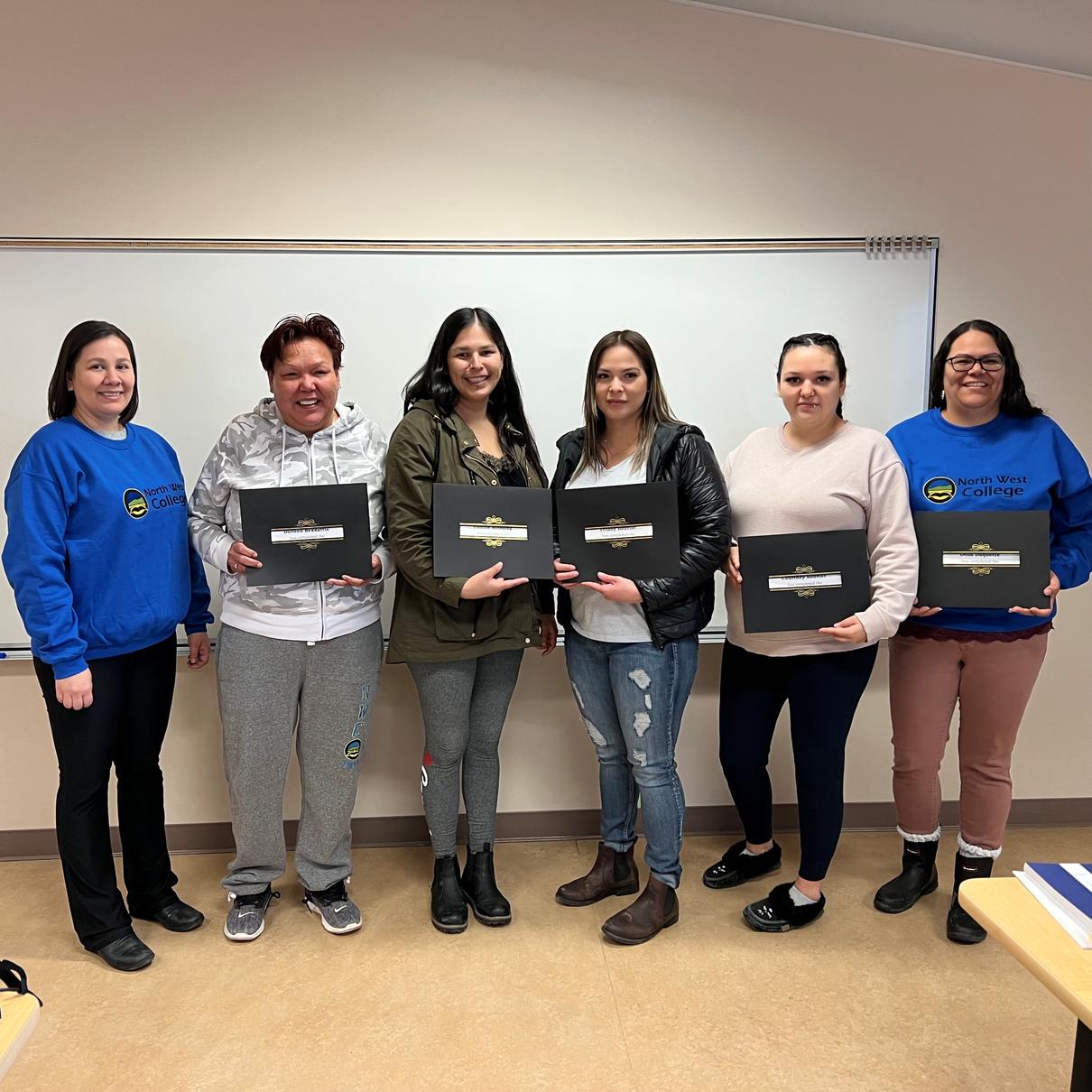BUSINESS & INDUSTRY

Working together to build capacity TRAINING PROGRAMS


Welcome 03 Meet our Team 04 NWC Advantage 05 Program Portfolio 06 Industry Credit 07 Institute Credit 17 Non-credit 31 Funding Opportunities 44 TABLEOF CONTENT Micro-credentials 29
Responding to needs of students and local industry, for more than four decades, North West College (NWC) delivers training and services to facilitate the growth of the communities it serves. The College is responsive to regional labour market demands and aligns the educational programming it offers to ensure continued social and economic development. This translates to the College being a respected educational provider offering a range of programs and services that extend from workplace readiness training to graduate programs in education.

NWC embraces its mission to enhance the wellbeing of the communities it serves.
At NWC, we value our relationships with industry. Let us show you how we can help your business succeed.
WELCOME • tansi • okâch • tanyán yahí • aaniin • o'mu weleyiw • edlánat'e • wâciyê • tawâw •ni-miyeeyihtenaan ee-waapamitaahk! •
3 B U S I N E S S & I N D U S T R Y
MEETOUR TEAM
The training you need, at the time you want!
Our Business Development team is here to connect with you and find solutions you need Connecting you to a portfolio of training products and services that can be tailored to increase your organizational capacity.


Tracey Conrad
Business Development Coordinator
tracey.conrad@northwestcollege.ca

306-234-5117
Bryce Bohun
Coordinator, Business & Industry, Contracts & Community Engagement
bryce.bohun@northwestcollege.ca
306-937-5117
Roxanne Henry
Business Development Program Associate
roxannehenry@northwestcollege.ca
306-234-5104
Our services are distributed throughout north west Saskatchewan. See what our team can do for you!
For more information contact us at businessdevelopment@northwestcollege.ca

4 B U S I N E S S & I N D U S T R Y
NWC ADVANTAGE

Flexibility
Training can vary in duration – f session to programs of several anytime, anywhere
Customization
We take the time to intimately u business objectives, operations culture.
Resources
Customized training options fro 100 programs We also build en programs tailored to fit the train requirements of our clients.
Indigenous Tr
We are committed to serving th Indigenous peoples by develop training programs for delivery o within the community.
Student Services
All NWC programs are fully supported by our Student Services team! When you partner with NWC the following services are always included:
Academic related difficulties
Personal challenges
Education and career decisions
Traumatic Event Response Specialist
Job Coach
PROGRAM PORTFOLIO
Customized workshops, courses or full programs
We can create customized professional development programs for your employees and managers tailored to meet your business needs. Provide training for your staff so they can enhance the bottom line.
Professional development opportunities range from business programs including HR, finance, management, and customer service modules. Enhance your skills and improve your upward mobility.
The training you need, at the time you want
We offer alternative program delivery times such as evenings or weekends and can bundle the courses into the tailored professional development you need to increase your organizational capacity.

6 B U S I N E S S & I N D U S T R Y
INDUSTRY CREDIT PROGRAMS


SASKATCHEWANTOURISM EDUCATIONCOUNCIL(STEC)
Accredited by STEC
Program Description
Saskatchewan Tourism Education Council (STEC) provide human resource products and services that enable Saskatchewan employers to maintain a highly qualified, professional workforce.
As with many of our programs and courses, STEC and emerit training is highly customizable
Courses
STEC offers numerous online and in person workshops such as:
Serve It Right Saskatchewan (SIRS)
The Government of Saskatchewan requires server intervention training for employees involved in the sale and service of alcohol. Serve It Right Saskatchewan is the official server intervention training program for Saskatchewan. This course is mandatory for everyone involved in the sale and service of alcohol
Service Best
Service Best will help you create memorable customer experiences, identify and respond to customer needs and turn dissatisfied customers into loyal fans.
Service First Workshop
Service Best will help you create memorable customer experiences, identify and respond to customer needs and turn dissatisfied customers into loyal fans.
Clean it Right
Tourism Saskatchewan introduced Clean It Right online training program to help tourism businesses promote clearly defined policies and procedures for cleaning and disinfecting their facilities
Helping people who work in the industry understand the significance of following the cleaning and disinfection procedures by adjusting current practices
Helping re‐gain consumer confidence in the industry by making the commitment to provide a clean and safe environment for customers and employees
Canadian Workplace Essentials Bartender
Transition into a new workplace can be a challenge For new workers in Canada, it is essential to develop a clear understanding of the values and attitudes Canadian employers are looking for.
Covering topics such as Behind the scenes, shift procedures, Selling and Serving: Professional Guest Service, Risk Management in the Food and Beverage Industry: Awareness and Compliance, Beverage Knowledge and Wine Pairing, Mixing and Serving Drinks and Professional Banquet Service: Techniques and Best Practices.
8 B U S I N E S S & I N D U S T R Y
SASKATCHEWANTOURISM EDUCATIONCOUNCIL-EMERIT
STEC also provides training and certification programs from emerit, which are recognized as the best training resources available to the tourism and hospitality industry. Developed by industry, for industry, emerit delivers the collective expertise of Canadian and international tourism professionals.
Courses (continued)
Food and Beverage Server
Exceed guest expectations by mastering the skills for excellent service Learn effective selling techniques, the art of table service, ways to respond to guest needs and complaints...and more.
Food Service Counter Attendant
They handle customer enquiries, prepare and maintain workstations, heat and finish cooking simple food items, and serve customers at food counters. Food Service Counter Attendants trained with emerit know health and safety regulations, how to respond to emergencies, and how to comply with applicable federal and provincial regulations.
Front Desk Agent
Front Desk Agents are often the first and last contact guests have with your property. This program covers all of the current skills to ensure efficiency, optimum guest experiences and return business
Housekeeping Room Attendant
emerit Housekeeping Room Attendant training ensures you pay attention to the little details while performing your general duties efficiently and thoroughly. The course includes all the fundamentals of good housekeeping as well as resources and tips to take you from an average to an exceptional Housekeeper.
Kitchen Helper
Kitchen Helpers trained with emerit master the tools of the kitchen trade from basic cutlery to oven operations. Working behind the scenes, you will help create memorable dining experiences so guests stay longer and generate positive word of mouth for your establishment.
Line Cook
Covers the knowledge, skills and attitudes needed to succeed as a line cook in today's kitchens.
Reservation Sales Agent
Covering topics such as Building report with the customer, Explaining company policies and insurance options, cancel or change a reservation, processing payments and refunds and Emergencies.
9 B U S I N E S S & I N D U S T R Y
SASKATCHEWANTOURISM EDUCATIONCOUNCIL-EMERIT
Accredited by STEC and emerit ca
Courses (continued)
Retail Sales Associate
Retail Sales Associates become experts at all aspects of retailing from professionalism to customer service, sales, inventory, and store appearance. This can result in significant increases in sales, exceptionally satisfied and loyal customers, and a solid foundation for your retail career.
Sensitivity and Diversity Training
Sensitivity and Diversity training resources from emerit are designed to help tourism and hospitality businesses prepare for increasing diversity in their workplace, and in their guests. Increased numbers of international travellers and of new Canadians in the workforce present a unique set of challenges and opportunities for tourism and hospitality operators, and businesses that are prepared for this new reality will be able to gain valuable employees and attract international visitors to their establishments.
Workplace Essentials
This training will help you develop transferable skills employers look for when making hiring decisions skills that are the building blocks all occupations are based on.

10 B U S I N E S S & I N D U S T R Y
SAFETYTRAINING &TICKETS
*Various Providers Courses
Common Safety Orientation (CSO) (ESC – Energy Safety Canada)
Common Safety Orientation (CSO) is intended for new workers in the oil and gas industry With content that is driven and endorsed by industry, the CSO provides consistent safety messaging that clearly explains safe work practices and eliminates the need for redundant general orientation training and is standard for most oil and gas companies.
It introduces workers from all sectors to safe work practices and incorporates Energy Safety Canada’s 10 Life Saving Rules, which are based on addressing the most at-risk behaviours
Approximately 4 hours to complete course and exam Available In-Person and Online
Confined Space Entry and Monitor
Confined space work involves some of the most critical hazards in the oil and gas industry, so it is critical to understand and plan for them before starting work This online Confined Space Entry and Monitor course teaches participants to identify, understand and mitigate the potential hazards of working in restricted and confined spaces. Developed using the Canadian Standards Association’s Z1006-16 Management of Work in Confined Spaces and the Canadian Association of Oil and Gas Producers’ Code of Practice for Confined Space.
Approximately 8 hours to complete course and exam
This course is instructor led
Certified by ESC
Elevated Work Platform
The course includes an instructor led powerpoint presentation, videos, class exercises, inspection and use of an EWP and a written knowledge test. Student will receive theory training for both Self Propelled Boom Platform (Standard CSA-B354.4-02) and Self Propelled
Elevating Work Platform (Standard CSA-B354 2-01)
Classroom portion in the morning starts at 8 a.m. There is a practical component required for this course. Participants are required to complete practical training on the same day as the classroom training.
PPE (Personal Protective Equipment) is required for this course (Hard Hat, Steel Toed Boots, Gloves, Glasses and harness) coveralls recommended Students must have proof of a fall protection course
Approximately 8 hours (classroom length 4-5 hours then practical to follow) This course is instructor led
Fall Protection
This course provides basic fall protection training to work in areas with potential fall hazards. Participants will engage in hands-on training activities, including inspecting, fitting, adjusting and connecting fall protection systems and components. While this basic course can be used as part of a worker's competency assessment, the employer must designate a worker as a "competent person" based on specific tasks assigned.
Approximately 8 hours to complete course and exam
This course is instructor led
Certified by ESC
11 B U S I N E S S & I N D U S T R Y
SAFETYTRAINING &TICKETS
*Various Providers
Courses (continued)
Fire Extinguisher Training Level 1-Live Fire
Fire Extinguishers Course will guide you through all aspects of Fire Extinguishers, from the types of fires, to the classes of Fire Extinguishers. The course has been designed to teach you what you need to know to safely operate a fire extinguisher and understand what types of extinguishers can be used on what types of fires, as well as maintenance and fire safety, so by completing this course you can become a better educated worker and improve your knowledge of an important part in workplace safety
Approximately 4 hours to complete course and exam This course is instructor led
St. John Ambulance Standard First Aid CPR Level C & AED
Standard First Aid Level C is for individuals requiring comprehensive information on First Aid and CPR for their workplace, school, or personal interest
Approximately 16 hours to complete course and exam. This course is instructor led.
St. John Ambulance Standard First Aid Level BLS CPR & AED
The Basic Life Support (BLS) course is for those working in healthcare and covers advanced CPR techniques.
Approximately 16 hours to complete course and exam. This course is instructor led.
St. John Ambulance First Aid & CPR Recertification
Recertification courses allow you to refresh your memory, renew your skills and stay up to date on the latest techniques.
1 Day course. This course is instructor led.
Prerequisite: In order to take this course the participant must have a current (unexpired) Standard First Aid (SFA) certificate.
Red Cross Standard Red Cross Standard First Aid CPR Level C & AED
This course offers first aid and CPR skills for those who need training due to work requirements or who want more knowledge to respond to emergencies at home.
Approximately 16 hours to complete course and exam. This course is instructor led
Red Cross Standard First Aid & CPR Recertification
Recertification courses allow you to refresh your memory, renew your skills and stay up to date on the latest techniques.
1 Day course. This course is instructor led
Prerequisite: In order to take this course the participant must have a current (unexpired) Standard First Aid (SFA) certificate.
12 B U S I N E S S & I N D U S T R Y
SAFETYTRAINING &TICKETS
*Various Providers
Courses (continued)
Global Ground Disturbance
This course is essential when working in the oil and gas industry. Students will learn the causes of cave-ins, pre-job planning, job safety, and trenching regulations.
Approximately 8 hours to complete course and exam
This course is instructor led
H2S Alive
This course shows workers how to work safely in and around hydrogen sulphide (H2S) environments.
Approximately 8 hours to complete course and exam
This course is instructor led
Certified by ESC
Managing Food Safety
This online course covers introduction to food safety, biological hazards, food safety hazards (chemical, physical, allergen), facilities, design and construction, equipment and utensils, control of hazards (from purchasing to service/distribution), cleaning and sanitation, pest control, employee and visitor illness, injury and hygiene, education and training, and program management (HACCP).
Approximately 8 hours to complete course and exam
Available In-Person and an Online option with face-to-face invigilation
Mental Health First Aid
Mental Health First Aid (MHFA) is the support provided to a person who may be experiencing a decline in their mental well-being or a mental health crisis. The Mental Health Commission of Canada reports that one in every five Canadians experiences a mental health problem within a given year. While we often know a lot about physical illness, there tends to be less knowledge about mental health or substance use problems This lack of understanding leads to fear and negative attitudes towards individuals living with these problems. It prevents people from seeking help for themselves and from providing appropriate support to people around them.
Various versions available with In-Person and Online options:
MHFA Standard 9 hours to complete course and exam
MHFA Basic 12 hours – Intended for adults interacting with adults (18 years and older)
MHFA Adults 14 hours – Adults who Interact with Youth (aged 14 -25)
MHFA Supporting Youth 10 hours – Substance use disorders
MHFA Seniors 14 hours – Adapted from “Basic“ intended to increase the capacity of seniors, families, informal caregivers, friends, staff in care settings and communities.
MHFA Supporting Older Adults – 10 hours
MHFA First Nations 20 hours – intended for First Nations however, is also recommended for anyone that works with First Nations.
13 B U S I N E S S & I N D U S T R Y
SAFETYTRAINING &TICKETS
*Various Providers
Courses (continued)
Skid Steer Operator Training
This course provides students a basic understanding of skid steer operation, attachments commonly used, load handling, hazards and hands on practice operating a skid steer through various common tasks. Plus several other topics.
PPE (Personal Protective Equipment) is required for this course (Hard Hat, Steel Toed Boots, Gloves, and Glasses) coveralls recommended Approximately 6 hours This course is instructor led
Telehandler Operator (Zoom Boom) Training
This training provides students with an understanding of hazard assessment specific to Telehandler equipment, including causes of fatalities. Topics include choo choosing the right telehandler, traffic and pedestrian conflicts, minimum safe approach distances and PPE requirements. Pre-inspection is thoroughly covered starting with the operator's manual, to run up and function testing of the equipment. Optional attachments are discussed including the hazards and common attachment systems used. Students will also have opportunity to demonstrate safe operation of a telehandler under routine working situations.
PPE (Personal Protective Equipment) is required for this course (Hard Hat, Steel Toed Boots, Gloves, and Glasses) coveralls recommended
Approximately 8 hours (classroom length 4-5 hours then practical to follow) This course is instructor led
Transportation of Dangerous Goods (TDG)
The Transportation of Dangerous Goods online training course includes TDG legislation, classification, safety marks, documentation, safe handling, incident reporting and emergency response.
Approximately 4 hours Available In-Person and Online
WHMIS – Workplace Hazardous Materials Information System
WHMIS is a short form for Workplace Hazardous Materials Information System. It is a comprehensive plan for providing information on the safe use of hazardous materials used in Canadian workplaces. Information is provided by means of product labels, material safety data sheets (MSDS) and worker education programs
Approximately 4 hours Available In-Person and Online
14 B U S I N E S S & I N D U S T R Y
FIRSTAID TRAINING
*Various Providers
Which CPR level is right for me?
Many heathcare students will be heading out for clinicals this spring and they will need to get the right CPR certification for the job. Here’s what students (including nursing, personal support workers, medicine and other healthcare) need to know to select the best CPR course.
We are often asked about the differences between CPR A, CPR C and CPR BLS. There’s a lot of confusion about the certifications and who should be certified in which level. Hopefully we can shed some light here so that you can chose the right CPR level to meet your needs. Basically, you should pick the CPR level based on your individual, business or school requirements. Whether you work in healthcare or early childhood education, whether you are a lay person or need training for the workplace, there is the right training for you
BLS – Basic Life support
If you are a professional first responder or healthcare provider then this is likely the level for you The Canadian Red Cross discontinued the HCP (Health Care Provider) level of CPR in the spring of 2019 and replaced it with BLS (Basic Life Support). This level is more in keeping with the skills required for teams of professional first responders, like paramedics and firefighters, or hospital and clinic healthcare workers, like nurses and doctors . This course is just a few hours long and is valid for 1 year. This means to remain current, certificate-holders must recertify their skills prior to the expiry date on the certification. To register for a BLS course, please click here
CPR-C
CPR C is the level that the majority of Canadians complete It covers all CPR and choking techniques for adult, child, and infant, as well as two-rescuer CPR and includes Automated External Defibrillator (AED) training. This level is usually required by early childhood educators, security guards or just about anyone who doesn’t work in healthcare. The techniques are easy to learn and have been simplified over the years to help trained individuals better remember the necessary skills in the event of cardiac arrest. The most common place for CPR to be performed is at home and usually on a friend or loved one. It is wise for everyone over the age of 13 to learn CPR which is recertified every three years prior to the expiry date noted on the certification. Sign up for CPR C and bring your friends and family.
https://sosfirstaid.ca/courses/cpr-aed-certifications/cpr-c-and-aed/
15 B U S I N E S S & I N D U S T R Y
FIRSTAID TRAINING
*Various Providers
CPR A
This level of CPR is usually required at work to meet workplace health and safety requirements. CPR A involves skills related to CPR, choking and circulatory emergencies for adults only that take just a few hours to learn. In most cases, for CPR purposes, an adult is 8 years old and older. This certification also includes training on the use of an Automated External Defibrillator (AED)
The different levels of CPR can be combined with a first aid certification.
Standard First Aid – BLS
This program provides comprehensive First Aid training & CPR techniques that help you respond to emergencies at home, work, or anywhere medical emergencies can occur. We will cover such topics as first aid for circulatory and breathing emergencies, CPR Level BLS choking, AED, disease transmission prevention, wound care, treating injuries to the head and spine, and much more. The Standard First Aid portion of this card is valid for 3 years but the BLS portion must be renewed yearly (as noted above).
https://sosfirstaid.ca/courses/first-aid-cpr-aed-certifications/standard-first-aid-cpr-hcp-blsaed/
Standard First Aid – C
This program is a Standard First Aid course (see above) but with a Level C CPR and AED (see above). This certification is valid for 3 years and must be renewed prior to expiry.
https://sosfirstaid.ca/courses/first-aid-cpr-aed-certifications/standard-first-aid-cpr-c-aed/
Standard First Aid – A
This level of certification meets occupational health and safety requirements in Ontario workplaces with more than 5 employees. SOS First Aid provides this training at the client’s workplace for a minimum of 6 participants
16 B U S I N E S S & I N D U S T R Y
INSTITUTE CREDIT PROGRAMS


EDUCATIONAL ASSISTANT
Accredited by Lakeland College
Program Description
In our Educational Assistant program, you’ll learn to work with students; with different abilities, one-on-one and in small groups and in a variety of settings.
You’ll learn; positive behaviour supports, human development, sensory development and how to support students with exceptionalities.
You’ll graduate with the skills you need to find a career in; before and after school care, kindergartens, recreation and community centres, elementary, middle and high school classrooms and respite care.
Length
39 Weeks
Admission Requirements
High school diploma with ELA A30 and B30 combined
Field Placement Requirement
A criminal record check (with a vulnerable sector check) is required and is requested through the RCMP in your hometown. Based on the information received, students may be denied entrance into the program. The cost of a criminal record check varies among detachments
An Intervention Record Check (IRC) may also be required.
Courses
CO 118 - Communication Skills
HS 114 - Lifespan Studies I
HS 115 - Foundations of Inclusion
HS 155 - Positive Behaviour Supports
HS 225 - Supporting Diversity
HS 230 - Sensory Development
TA 121 - Educational Assistant Practicum I
TA 122 - Educational Assistant Practicum II
TA 140 - Educational Assistant Professionalism
TA 141 - Supporting Instruction
YC 102 - Building Resiliency
Electives: Choose one of the following
ASL 101 - American Sign Language I
ED 120 - Observation & Play
HS 183 - Personal Assistance Awareness
YC 218 - Animals Assisted Interventions
18 B U S I N E S S & I N D U S T R Y
SASKATCHEWANECE CERTIFICATIONLEVELS
Government of Saskatchewan
Program Description
A minimum of an ECE Level I is required in order to work 65 hours or more per month in a child care centre. An ECE Level III is required for directors of child care centres.
There are three categories of ECE Certification:
ECE Level I is awarded after completing nine credit units (three courses) that are related to early childhood, including one course from each of three areas: Child Development, Programming and Relationships or after you have finished an ECE orientation from a recognized post-secondary institution.

ECE Level II is awarded after you have completed a one-year ECE certificate program from a recognized post-secondary institution or after you have finished an equivalent amount of post-secondary coursework.
ECE Level III is awarded after you have finished a two-year ECE diploma program from a recognized post-secondary institution or after you have finished an equivalent amount of post-secondary coursework.
Length
Early Childhood Educator I – Nine Credit Units (3 Courses)
Early Childhood Educator II – Full Certificate
Early Childhood Educator III – Diploma
12 weeks
1 Year
2 Years
Learn more about ECE Certification by reading the Saskatchewan ECE Certification Guide available at:
https://publications.saskatchewan.ca/api/v1/products/111838/formats/125636/download
19 B U S I N E S S & I N D U S T R Y
EARLYCHILDHOODEDUCATION CERTIFICATE
Accredited by Lakeland College
Program Description
As you work towards your one-year certificate and two-year diploma, you’ll learn how to:
Use observation skills to create experiences for young children based on their interests and needs.
Design learning environments that invite play and exploration both indoors and outside
Develop relationships and support children and their families. Run an early learning program.
Length
One year Certificate
Admission Requirements
Certificate: High school diploma with ELA A30 and B30 combined.
Diploma: Successful completion of the Early Childhood Education certificate program or an equivalent with at least a 2 0 Grade Point Average (GPA)
Field Placement Requirement
A criminal record check (with a vulnerable sector check) is required and you are responsible for requesting one through the RCMP in your hometown. The cost may vary. Based on the information received, students may be denied entrance into the program.
An intervention Record Check (IRC) may be required
A current First Aid in Childcare Certificate may be required.
Courses
Year 1 required courses:
CO 118 - Communication Skills
ED 109 - ECE Practicum I
ED 110 - ECE Practicum II
ED 120 - Observation & Play
ED 121 - Early Childhood Professionalism
HE 158 - Health, Safety & Nutrition
HS 114 - Lifespan Studies I
HS 155 - Positive Behaviour Supports
HS 180 - Art, Music & Movement Experiences
HS 182 - Literacy, Math & Science Experiences
HS 240 - Family Studies
SS 245 - Infant & Toddler Care
20 B U S I N E S S & I N D U S T R Y
EARLYCHILDHOODEDUCATION DIPLOMA
Accredited by Lakeland College
Program Description
As you work towards your one-year certificate and two-year diploma, you’ll learn how to:
Use observation skills to create experiences for young children based on their interests and needs.
Design learning environments that invite play and exploration both indoors and outside
Develop relationships and support children and their families. Run an early learning program.
Length
Two year Diploma
Admission Requirements
Certificate: High school diploma with ELA A30 and B30 combined
Diploma: Successful completion of the Early Childhood Education certificate program or an equivalent with at least a 2.0 Grade Point Average (GPA).
Field Placement Requirement
A criminal record check (with a vulnerable sector check) is required and you are responsible for requesting one through the RCMP in your hometown. The cost may vary. Based on the information received, students may be denied entrance into the program.
An intervention Record Check (IRC) may be required
A current First Aid in Childcare Certificate may be required.
Courses
Year 2 required courses (Diploma)
*After successful completion offirst year courses.
ED 230 - Practicum III
ED 231 - Practicum IV
ED 235 - Leadership & Management in ECE
ED 238 - Outdoor & Nature Play
ED 243 - Emergent Environments for Children
HS 115 - Foundations of Inclusion
HS 202 - Leadership Activities
HS 225 - Supporting Diversity
HS 230 - Sensory Development
HS 240 - Family Studies
HS 242 - Intercultural Competencies
MH 201 - Infant & Toddler Mental Health
Diploma electives (Choose one)
ASL 101 - American Sign Language 1 Part A
HS 183 - Personal Assistance Awareness
YC 218 - Animals Assisted Interventions
YC 236 - Assessment and Intervention
21 B U S I N E S S & I N D U S T R Y
CONSTRUCTIONWORKERPREPAPPLIEDCERTIFICATE
Accredited by Saskatchewan Indian Institute of Technology
Program Description
The program includes classroom and hands on training, life skills training, career planning, and safety tickets. Students can also complete a work practicum and can earn 300 hours of trade time credit toward apprenticeship in Carpentry.

Graduates of this program can expect to find entry level work on residential or industrial construction sites.
Length
10 Weeks
Admission Requirements
Minimum Grade 10, Adult 10, with no modified Math or Science, or GED Applicants with a lower level may be considered depending on their experience Applicants may need to complete an interview
No international students
Canadian Language Benchmark Assessment of six - CLB6
Industry Requirement
Good eyesight, hearing, manual dexterity, and physical mobility. May also be required to work at heights and in all weather conditions
22 B U S I N E S S & I N D U S T R Y
RESIDENTIALRENOVATION& CONSTRUCTION
Accredited by Saskatchewan Indian Institute of Technology
Program Description
The program includes classroom and hands on training, life skills training, career planning, and safety tickets.
Graduates of this program can expect to find entry level employment with residential and commercial construction companies, carpentry contractors, and maintenance departments of factories, plants and other establishments as construction trades helpers and labourers.
Graduates of this program are also eligible to receive 300 hours of trade time credit toward a Carpenter apprenticeship.
Length
12 Weeks
Admission Requirements
Minimum Grade 10 with Grade 10 Math and Science
No international students.
Canadian Language Benchmark Assessment of six - CLB6
Industry Requirement
Good eyesight, hearing, manual dexterity, and physical agility, be able to work at heights and in confined spaces
Courses
RRAC 100 - Orientation and Job Readiness
RRAC 110 - Construction Trade Math
RRAC 120 - Construction Safety
RRAC 130 - Portable and Stationary Tools
RRAC 140 - Construction Basics
RRAC 150 - Renovation Basics
Safety Courses as required (varies by Trade)
23 B U S I N E S S & I N D U S T R Y
TRI-TRADES APPLIEDCERTIFICATE
Accredited by Saskatchewan Indian Institute of Technology
Program Description
The program includes classroom and hands on training that will familiarize students with work in carpentry, electrical, and plumbing, life skills training, career planning, and safety tickets.
Graduates of this program can expect to find entry level employment with residential and commercial construction companies, carpentry contractors, and maintenance departments of factories, plants and other establishments. Graduates of this program can expect to find employment on residential and commercial construction sites as construction trades helpers and labourers.

Length
12 Weeks
Admission Requirements
Minimum Grade 10 with Grade 10 Math
Those who do not meet the academic requirements may be considered, and may be subject to academic assessment for placement.
Industry Requirement
Good eyesight, hearing, manual dexterity, and physical agility.
Courses
TTCC 110 - Carpentry Practices
TTCE 120 Electrical Practices
24 B U S I N E S S & I N D U S T R Y
CARPENTRY APPLIEDCERTIFICATE
Accredited by Saskatchewan Polytechnic
Program Description
As a student in the Carpentry Applied Certificate program, you will receive basic knowledge and develop skills required to work in the residential, commercial construction and related industries.
Length
18 Weeks
Admission Requirements
Grade 10 English Language Requirement
ACCUPLACER - 250 Arithmetic, 243 Reading & 236 Writing
Industry Requirement
Good eyesight, hearing, manual dexterity, and physical agility.
Courses
BPRT 127 - Construction Documents
CNST 126 - Site Layout
CONC 122 - Concrete
EQPT 126 - Tools
FNDT 120 - Foundations
FRMG 126 - Floor Framing
FRMG 221 - Wall Systems
FRMG 250 - Roof Trusses
JOBS 125 - Essential Job Skills
MATE 126 - Building Materials
MATH 140 - Trade Math
PROJ 122 - Projects
SCAF 120 - Scaffolds and Rigging
SFTY 129 - Safety Awareness
WORK 125 - Work Placement
25 B U S I N E S S & I N D U S T R Y
CARPENTRY CERTIFICATE
Accredited by Saskatchewan Polytechnic
Program Description
Students will get the basic training you need to get a job in the trade by building practical knowledge and skills in:
Tools and equipment
Construction documents and quantity survey
Site layout and concrete
Footings and foundations
Framing and building envelope
Exterior finishing and roof coverings
Interior finishing and cabinets
Materials and scaffolds
Trade math and communications
Length
30 Weeks
Admission Requirements
Grade 10
English Language Requirement
ACCUPLACER - 250 Arithmetic, 243 Reading & 236 Writing
Industry Requirement
Good eyesight, hearing, manual dexterity, and physical agility.
Courses
BPRT 127 - Construction Documents
CNST 126 - Site Layout
CONC 122 - Concrete
EQPT 126 - Tools
FNDT 120 - Foundations
FRMG 126 - Floor Framing
FRMG 221 - Wall Systems
MATE 126 - Building Materials
MATH 127 - Trade Math
PROJ 122 - Projects
SFTY 129 - Safety Awareness
BPRT 222 - Construction Documents
CNST 127 - Transits
EXFN 220 - Exterior Finishes and Accessories
EXFN 221 - Exterior Windows and Doors
FRMG 222 - Roof Framing
INFN 320 - Interior Finishes
INFN 321 - Wall Cabinets
JOBS 125 - Essential Job Skills
ROOF 220 - Roof Coverings
SCAF 120 - Scaffolds and Rigging
STRS 120 - Wood Stairs
WORK 125 - Work Placement
26 B U S I N E S S & I N D U S T R Y
ELECTRICIAN APPLIEDCERTIFICATE
Accredited by Saskatchewan Polytechnic
Program Description
Electrician is a skilled trade. Having an applied certificate will get you noticed by employers and put you on the fast track to having a career as an electrician. The more education and experience you get, the higher you can climb on the wage-earning ladder. A fourth-year journeyperson electrician can earn double the hourly wage of a first-year electrician apprentice
You'll get lots of hands-on practice using standard tools of the trade. You'll also learn how to read and interpret construction drawings.
Length
17 Weeks
Admission Requirements
Grade 11 with Foundations of Mathematics 20 or Workplace and Apprenticeship
Mathematics 20 or Pre-Calculus 20 English Language Requirement
ACCUPLACER - 250 Arithmetic, 245 Quantitative Reasoning, Algebra and Statistics & 247 Reading & 236 Writing
Industry Requirement
Good eyesight, hearing, manual dexterity, and physical agility.
Courses
BT 100 - Introductory Electrical Theory and Practices
BT 141 - Resistive Circuit Analysis
BWC 121 - Conductors and Branch Circuits
BWC 122 - Extra Low Voltage, Magnetism and Meters
JOBS 125 - Essential Job Skills
PLS 122 - Single Dwelling Plans, Lighting and Services
SFTY 130 - Safety and Personal Protective Equipment
TOOL 149 - Tools and Fasteners
WM 131 - Wiring Methods (Cables)
WM 132 - Wiring Methods (Raceways)
27 B U S I N E S S & I N D U S T R Y
PLUMBING&PIPEFITTING APPLIEDCERTIFICATE
Accredited by Saskatchewan Polytechnic
Program Description
The Plumbing and Pipefitting program provides the knowledge and skills you need for an entry level job.
Plumbers install, replace and maintain water and sewage systems in residential, commercial and industrial buildings Many are also licensed gas fitters
Successful completion of the Plumbing and Pipefitting applied certificate can open the door to entry level jobs with plumbing contractors and construction companies, as well as with maintenance departments in power, mining or manufacturing companies.
Length
16 Weeks
Admission Requirements
Grade 11
English Language Requirement
ACCUPLACER - 250 Arithmetic, 245 Quantitative Reasoning, Algebra and Statistics & 247 Reading
Industry Requirement
Good eyesight, hearing, manual dexterity, and physical agility.
Courses
DRAW 101 - Blueprint Reading
INDG 100 - Introduction to Indigenous Studies
JOBS 125 - Essential Job Skills
MATH 112 - Trade Math
PIPE 102 - Pipe Fabrication Theory
PIPE 103 - Pipe Fabrication Shop
PLMB 102 - Codebook Theory
PLMB 103 - Gasfitting Theory
PLMB 104 - Gasfitting Shop
PROJ 118 - In-House Projects
SFTY 139 - Trade Related Safety
TOOL 118 - Basic Tools and Materials Theory
TOOL 119 - Basic Tools and Materials Shop
WLDR 135 - Welding
WORK 105 - Work Experience
28 B U S I N E S S & I N D U S T R Y
MICRO CREDENTIAL INSTITUTE CREDIT


PRE-EMPLOYMENTCOOKING MICRO-CREDENTIAL
North West College
Program Description
Pre-employment cooks prepare meals and snacks for large numbers of people and they are in demand in restaurants, hotels, health and educational institutions and remote work camps. This program focuses on practical skills and the majority of learning is done in a commercial kitchen setting.
Pre-employment cooking is an intensive 12 weeks entry level cooking program that is designed to give the skills and hands on learning experience that employers are seeking, allowing graduates to transition in to the workforce quickly.

Length
12 Weeks
Admission Requirements
Grade 10 English Language Requirement
Industry Requirement
Good eyesight, hearing, manual dexterity, and physical agility.
Courses
PEC 101 - Safety and Sanitation
PEC 102 - Tools and Equipment
PEC 103 - Culinary Basics
PEC 104 - Vegetables, Fruits and Starches
PEC 105 - Grade Manager
PEC 106 - Soups, Stocks and Sauces
PEC 107 - Breakfast Cooking
PEC 108 - Meats
30 B U S I N E S S & I N D U S T R Y
NON CREDIT PROGRAMS


FINANCIAL BASICS
Financial Consumer Agency of Canada (FCAC)
Program Description
Although a one day workshop cannot cover financial management in depth, Financial Basics will introduce you to the topics you need to know about to successfully manage your money.
You will learn:
How to manage your spending and prepare a realistic budget

Ways to save
How to pay off debt
How to invest to make your money work for you
How to plan to reach your own financial goals
How to avoid financial frauds and scams
Length
1 Day (Approx. 6 hours)
Admission Requirements
Workshop was designed for Canadians aged 18 – 29
Materials
Participant Handbook
Presenter Manual
32 B U S I N E S S & I N D U S T R Y
ESSENTIALSKILLSFOR THEWORKPLACE(ESWP)

North West College
Program Description
The courses will focus on teaching low literacy, Levels One and Two learners. First Nations/Metis learners and the unemployed the nine Essential Skills: Reading, Document Use, Numeracy, Writing, Oral Communication, Working with Others, Thinking, Digital Technology, Continuous Learning.
This program will be an opportunity for low skill job seekers to acquire the essential skills required to enter work in local businesses and assist employers in their need to hire and retain workers.

Industry credit classes will be added on as necessary. Most commonly used will be Food Safe, First Aid – CPR, WHMIS, TDG, Fall Protection, H2S Alive, Ground Disturbance, Construction Safety, Fire Awareness or Confined Space Safety tickets will be determined based on what is deemed necessary in the employment field.
Length
Approximately 3-4 months
Admission Requirements
Workshop was designed for Canadians aged 18 – 29
33 B U S I N E S S & I N D U S T R Y
ESSENTIALSKILLSFORTHE WORKPLACE-PARKWORKER
North West College
Program Description
Nine essential skills of reading, document use, writing, numeracy, oral communication, thinking, digital technology, working with others, and continuous learning. All skill based tasks will be tailored to be relevant to the Park Worker career path. Including topics such as:
Rototilling
Sprayer
String Trimming
Tree and Shrub Bed Maintenance

Tree Planting
Tree Removal
Turf Cutting
Turf Restoration
Skill based training will include safety ticket training in: First Aid & CPR C, WHMIS, ESC Fall Protection, Global Ground Disturbance, Transportation of Dangerous Goods, Confined Space Entry, ESC H2S Alive, Chainsaw Awareness – Level 1, Bear & Wildlife Awareness.
Life skills and Personal skills training will be added to develop soft skills such as positive attitudes, showing responsibility, showing adaptability, time management, goal setting, etc
Job readiness preparation. Training in job readiness will include workshops in resume and cover letter writing, mock interviews, researching potential jobs online, assembling portfolios, and applying for jobs online.
Work placement - Optional
Length
Approximately 10 weeks
34 B U S I N E S S & I N D U S T R Y
SKILLSFORSUCCESSNONCREDIT
North West College
Program Description
Skills for Success provide Canadians with everyday skills needed for work, learning and life. Improving them will help you succeed in today’s and tomorrow’s workplace.
Length
Approximately 3-4 months
Admission Requirements
Open to anyone. Some programs are available online.
Courses
Communication: In this workshop, you’ll think about your communication skills. You’ll think about your strengths and areas to work on.You’ll learn how to be a better communicator with everyone you meet
Essential Skills Workbook for the Trades: Workbook with a variety of exercises to help you practice your reading, writing, numeracy and document use abilities.
Numeracy: We use numbers and math every day, like when we count our overtime hours at work, go shopping, or make a monthly budget. This workbook talks about how and why we use numbers and how to improve numeracy skills
Problem Solved: A guide for employees and learners Guide designed to support employees and learners who want to practice and improve their problem-solving skills.
Reading: Reading helps us find information and communicate with others. This workbook talks about how and why we read and key strategies that can improve reading skills
Stress Management: Stress is a normal part of life. But that doesn’t mean it’s easy to deal with! When too much stress builds up over time, it can affect our work, our personal lives, and even our health. Learning to deal with stress in a healthy way can improve our wellbeing, at work and at home.
Trades Math Workbook: Numeracy workbook with questions and learning material to help you practice your numeracy skills.
Vocabulary Building Workbook: A vocabulary workbook designed to help you improve your reading and writing skills. In includes 24 lessons with a variety of exercises designed to help you learn commonly used words.
Writing: We use writing every day at home and at work Good writing skills are useful in many different areas of life. This workbook talks about why writing is important in your life and how to get better at writing.
35 B U S I N E S S & I N D U S T R Y
MICROSOFTOFFICE2019& OFFICE365
EZ-REF Courseware
Program Description
EZ-REF Courseware offers us the ability to fully customize programs to suit your MIcrosoft Training needs.
Microsoft Access 2019 & 365
Beginning (6-8 hours)
Courses Database Concepts
Access Basics (Screen, Menu, Help)
Opening/Saving/Closing a File
Viewing a Table
Editing a Table
AutoCorrect and Spell Checking
Form vs. Table View
Changing a Table Image
Sorting
Printing a View
Page Setup and Printing
Creating and Restructuring a Table
Filtering and Finding Data
Creating Reports
Advanced (6-8 hours)
Creating Indexes
Parameter Queries
Crosstab Queries
Customizing Forms
Customizing Reports
Backing Up/Restoring
Compacting/Repairing a Database
Linked Table Manager
Startup Options
Protecting a Database
Customizing Access Options
Customizing the Quick Access Toolbar
Using Add-ins
Intermediate (6-8 hours)
Importing Spreadsheets
Publishing a Database Object
Creating a Primary Key
Converting Field Types
Changing Field Sizes
Custom Display Formats
Input Masks
Using the Lookup Wizard
Assigning Captions
Setting Default values
Using the Expression Builder
Creating Validity Rules & Text
Creating Queries
Saving/Opening Queries
Using Wildcards
Compound Queries
Creating calculated Controls
Using Summary Operators
Querying Multiple Tables
Action Queries
Creating Permanent Relationships
Enforcing Referential Integrity
Creating Custom Reports
Saving/Opening Reports
Creating Custom Forms
Saving/Opening/Printing Forms
Database Properties
36 B U S I N E S S & I N D U S T R Y
MICROSOFTOFFICE2019& OFFICE365
EZ-REF Courseware
Courses (continued)
Microsoft Excel 2019 & 365
Beginning (6-8 hours)
Spreadsheet Basics
Excel Basics (Screen, Menu)
Navigating Within a Worksheet
Changing the View Using Help
Entering, Editing, Deleting Data
Working with Blocks
Adjusting Column Widths & Row Height
Creating & Filling Formulas
Auto Fill
Using the Spell Checker
Saving, Opening & Printing Workbooks
Setting Print Options
Copying & Moving (Drag & Drop)
The Office Clipboard
Formatting (Alignment, Attributes)
Inserting & Deleting Rows/Columns
Using Built-In Functions
Customizing Cell Formats
Cell Styles
The Format Painter
Working with Charts
Absolute Addressing
Using & Creating Templates
Advanced (6-8 hours)
Creating Outlines
Pivot Tables & Pivot Charts
Advanced Chart Options
Adding Clipart, Graphic Files, AutoShapes
Adding Word Art
Using the Goal Seeker
Creating Scenarios
Adding an Outlook Task
Consolidating Data
Importing & Exporting
Customizing the Toolbar
Working with Styles
Custom Views
Themes
File Properties
Setting Program Options
Sharing Workbooks
Creating Web Pages
Intermediate (6-8 hours)
Find/Replace
Using Block Names
Working With Dates
Advanced Functions
Creating a Database
Sorting Records
AutoFilter & Custom Filters
Working with Tables
Creating an Array Formula
Linking Files
Creating a Workspace
Protecting Blocks/Worksheets
Freezing Panes
Splitting the Screen
Hiding Columns/Blocks
Multiple Worksheets & Tabs
Working with Chart Sheets
Hyperlinks
Sharing Workbooks
Tracking Changes
Adding Cell Comments
Conditional Formatting
Formatting Shortcuts
Custom Formats
37 B U S I N E S S & I N D U S T R Y
MICROSOFTOFFICE2019& OFFICE365
EZ-REF Courseware
Courses (continued)
Microsoft Word 2019 & 365
Beginning (6-8 hours)
MS Word Basics (Screen, Menu)
Shortcut Menus, Toolbars & ToolTips
Using “Tell me what…”
Changing Views
Creating, Saving, & Opening Files
Spell Checker, AutoCorrect
Previewing & Printing Files
Basic Editing, Deleting, Undeleting, Redoing
Click & Type
Formatting Text (Fonts, Point Size, Color)
Using the Format Painter
Adjusting Margins/Line Spacing/Alignment
Reveal Formatting
Setting Tabs, Changing Case, Page Breaks
Indenting, Centering, Right-Aligning Text
Moving & Copying Text (Drag & Drop)
Using the Office Clipboard
The Thesaurus & Grammar Checker
Using Smart Lookup
Creating Bookmarks
Printing Envelopes
Mailing Labels
Using and Creating Templates
Applying Document Themes
Advanced (6-8 hours)
Working with Tables
Performing Math
Importing Spreadsheets
Linking Files
Clipart, AutoShapes, WordArt
Using the Drawing Toolbar
Adding Diagrams & Charts
Watermarks & Text Boxes
Sorting & Selecting Merge Records
Creating Mailing Labels
Using & Creating Styles
Adding Footnotes/Endnotes
Cross-Referencing Text
Creating an Index
Inserting Table of Contents
Master & Sub Documents
Creating Web Pages
Customizing the Toolbar
Setting Program Options
Intermediate (6-8 hours)
Widows & Orphans
Protecting Text Blocks
Page Numbering
Headers & Footers
Inserting Fields
Find & Replace
Copying & Moving Between Files
Using the Office Clipboard
Columns (Newspaper)
Creating Borders
Creating Drop Caps
Mail Merge
Outlines
Bullet and Number Lists
Inserting Hyperlinks
Creating/Editing Templates
Comments
Using Quick Parts
Document Properties
Tracking & Reviewing Changes
Compare & Merge Documents
Protecting Documents
Research Features
Translating Text
WordArt
Adding Shapes
38 B U S I N E S S & I N D U S T R Y
MICROSOFTOFFICE2019& OFFICE365

EZ-REF Courseware
Courses (continued)
Microsoft Basics
One Day (6 - 8 hours)
Word Basics (Screen, Menus, Dialog Boxes)
Accessing Help
Viewing Options
Saving Documents
Spell Checking
Printing a Document
Closing/Opening/Creating Documents
Editing a File (Insert/Deleting/Undeleting)
Using Attributes/Fonts/Point Sizes
Changing Margins/Alignment
Excel Spreadsheet Basics
Entering/Editing/Deleting Data
Using the Mouse to Select Blocks
Adjusting Columns Widths
Entering Formulas
Using Built-In Functions
Using the Fill option
Margins/Headers/Footers
Saving, Closing & Printing
Aligning/Formatting Data
Inserting/Deleting Rows/Columns
Using Attributes/Fonts/Point Sizes
Cell Borders and Colors
AutoFormat
PowerPoint Basics
Changing Views
Working with Objects
Adding Text
Editing the Presentation
Saving & Printing
Creating a New Presentation
Adding/Deleting Slides
Drawing Objects & AutoShapes
Adding ClipArt
Moving/Copying between Applications
The Office Clipboard
Moving/Copying Between Office 365 Apps
Working with the Office Clipboard
39 B U S I N E S S & I N D U S T R Y
MICROSOFTOUTLOOK 2019&OUTLOOK365
EZ-REF Courseware
Courses
One Day (6 - 8 hours)
Outlook Basics (Help, Menus)
Navigating in Outlook & Creating Folders
Creating Messages
Copying/Moving Text
Using Attributes (Bold, Color, etc.)
Changing Fonts & Point size
Justification
Indenting Bullet Lists
Signature Blocks
Flagging Messages
Using the Spell Checker
Delivering/Getting Messages
Reading Messages
Deleting/Printing
Replying/Forwarding Messages
Working with Attachments
Using Stationary
Customizing Views
Organizing Messages
Using Rules
The Address Book
Handling
Junk Mail
Common Emoticons/Acronyms
Creating Appointments
Editing/Moving Appointments
Recurring Appointments
Deleting/Undeleting Appointments
Creating/Editing/Deleting Events
Printing/Publishing Your Schedule
Creating Notes
Creating a To Do List
Organizing Tasks
Editing/Moving Tasks
Completing/Deleting/Undeleting Tasks
Recurring Tasks
Accept, Decline and Delegate Tasks
Creating a Contact List
Deleting/Undeleting Contacts
Sorting/Grouping Contacts
Sending Contact Info
Saving a vCard
Scheduling Meetings
Adding Folder Shortcuts
Outlook Options
40 B U S I N E S S & I N D U S T R Y
MICROSOFTPOWERPOINT 2019&POWERPOINT365
EZ-REF Courseware
Courses
One Day (6 - 8 hours)
PowerPoint Basics (Screen, Menus)
Opening a Presentation
Using Help
Running a Slide Show
Changing Views
Spell Checking your Presentation
Working with Objects (Moving, Copying, Resizing, Deleting)
The Office Clipboard
Customizing Objects
Entering & Editing Text
Creating a New Presentation
Adding Headers and Footers
Working with Text Charts
Find/Replace
Saving Your Presentation
Printing
Adding & Deleting Slides
Working with Bullet Lists
Drawing Objects
Using the Ruler to Set Tabs & Indents
Adding Tables
Inserting Online Pictures
Creating WordArt
Working with SmartArt
Creating and Customizing Charts
Creating Slide Shows
Adding Animation/Transition Effects
Editing Master Slides
Creating Custom Backgrounds
Working with Themes
Using & Creating Templates
Sharing a Presentation
41 B U S I N E S S & I N D U S T R Y
MICROSOFTPUBLISHER 2019&PUBLISHER365
EZ-REF Courseware
Courses (continued)
One Day (6 - 8 hours)
PowerPoint Basics (Screen, Menus)
Opening a Presentation
Using Help
Running a Slide Show
Changing Views
Spell Checking your Presentation
Working with Objects (Moving, Copying, Resizing, Deleting)
The Office Clipboard
Customizing Objects
Entering & Editing Text
Creating a New Presentation
Adding Headers and Footers
Working with Text Charts
Find/Replace
Saving Your Presentation
Printing
Adding & Deleting Slides
Working with Bullet Lists
Drawing Objects
Using the Ruler to Set Tabs & Indents
Adding Tables
Inserting Online Pictures
Creating WordArt
Working with SmartArt
Creating and Customizing Charts
Creating Slide Shows
Adding Animation/Transition Effects
Editing Master Slides
Creating Custom Backgrounds
Working with Themes
Using & Creating Templates
Sharing a Presentation
42 B U S I N E S S & I N D U S T R Y
MICROSOFTTEAMS,OFFICE365, WINDOWS10&ZOOM
EZ-REF Courseware
Courses
One Day (6 - 8 hours)
When to Use & How to Manage Microsoft Teams & Office 365 Groups
Collaborating on files
Managing files in TEAMS
Managing Meetings in TEAMS
Using Chat
Windows 10
One Day (6-8 hours)
Using the Touch Keyboard
Logging On
Windows Hello
The Windows Desktop
Using the Taskbar
The Start Menu
Working with Apps
Changing Views
Working with Windows
The Action Center
Getting Help
Working with Cortana
Shutting Down
Working with Multiple Desktops
Using the File Explorer
Creating Folders
Renaming Objects
Moving/Copying Objects
Opening, E-Mailing & Printing Files
Deleting/Undeleting Objects
Working with Folders
Using the Recycle Bin
Working with Networks
Mapping/Disconnecting Drives
Using Network Locations
Sharing/Connecting to Printers
Customizing Folder Options
Working with Shortcuts
Customizing the Desktop
Customizing the Start Menu
Customizing the Taskbar
Working with Printers
Windows System Settings
Overview of Built-in Apps
Zoom
One day (6-8 hours)
Virtual Meetings
Team Chat
Online Whiteboard
Conference Room Systems
Schedule Meetings
Resources:
10 Tips and Tricks for Zoom
Zoom Power User Optimizations
43 B U S I N E S S & I N D U S T R Y
MICROSKILLS MISCELLANEOUS
North West College
Courses
Study Skills (Education Resources)
How to get organized and study skills
Exam taking skills
Essay writing tips
How to take multiple choice tests
Budgeting (FCAC – Financial Consumer Agency of Canada)
Financial Basics Workshop
Resume Workshop, Mock Interviews & Job Search (Job Coach)
Create or update your resume
Practice your job interview skills

Job Search Strategies
Conflict Resolution
44 B U S I N E S S & I N D U S T R Y
FUNDING OPPORTUNITIES TRAINING SUPPORT


CANADA-SASKATCHEWAN JOBGRANT
Government of Saskatchewan
Program Description
The Canada-Saskatchewan Job Grant is now accepting applications from eligible employers, pending available funding.
The Canada-Saskatchewan Job Grant is an employer-driven program that:
Helps businesses and non-profit organizations train new or existing employees for available jobs; and Provides more opportunities for unemployed and underemployed workers to receive training. Through the program, the employer contributes onethird of the training cost, while the federal and provincial governments contribute the remaining two-thirds.
Benefits
Employers: Employers can make multiple grant applications to a maximum of $100,000 per fiscal year, and up to $10,000 per individual trainee.
Select the trainees and the training program. Receive reimbursement for two-thirds of eligible training costs Employ the trainee at the end of training.
Eligibility
Employers
Private and not-for-profit sector employers are eligible.
Publicly funded organizations such as health regions, post-secondary training institutions, public libraries, municipalities and school divisions are not eligible under the program.
Self-Employed individuals are not eligible to participate as CSJG supported trainees.
Trainees
Must have a valid Social Insurance Number. Be a Canadian citizen, Permanent Resident of Canada, or temporary resident with authorization for emergency travel from the Government of Canada holding a valid Canadian work permit. Both existing and potential employees are eligible.
Temporary foreign workers or temporary residents without authorization for emergency travel and a valid Canadian work permit are not eligible.
46 B U S I N E S S & I N D U S T R Y
CANADA-SASKATCHEWAN JOBGRANT
Government of Saskatchewan
Training Cost
Tuition fees or fees charged by the training provider; Mandatory student fees; Textbooks, software and other required materials; Learning material fees; and Examination fees
Training taken prior to an approved contract is not eligible for funding.
Training
Training is flexible. Employers choose the training program and mode of delivery that will meet their needs within the following requirements:
Must be delivered by a third party not affiliated with the employer applicant; Must be a minimum of 24 hours in length per trainee by the same training provider and completed within a 52 week period; Must result in a credential (record of completion, certificate, grade, etc ); and Must not replace an employer's existing investment in training.
Trainers
Third-party trainers could include:
Post-secondary education institutions; Private vocational schools, trade unions; and Private industry trainers
How to Apply
Interested employers must complete the Employer Application Form and obtain a Training Provider Quote. For more detailed information on how to apply, view the Canada-Saskatchewan Job Grant Applicant Guide
Each application can only have one training provider quote attached to it. Only fully completed applications will be accepted for assessment. Applications will be accepted, assessed and approved based on available funding.
Please note that a completed application is not a guarantee of funding Training requests must be approved and a contract negotiated between the employer and the Government of Saskatchewan to be eligible for program funding.
Further Information or to Apply go to:
https://www.saskatchewan.ca/business/hire-train-and-manage-employees/apply-forthe-canada-saskatchewan-job-grant
47 B U S I N E S S & I N D U S T R Y
RE-SKILLSASKATCHEWAN TRAININGSUBSIDY
Government of Saskatchewan
Program Description
The Re-Skill Saskatchewan Training Subsidy (RSTS) program is a new, temporary program that provides businesses with the financial support to train employees as the province emerges from the pandemic and economic recovery. This program supports eligible Saskatchewan employers to access financial supports for employerdriven, short term training programs for their employees
Funding to support training can help employers evolve from the impacts of the pandemic into economic recovery.
The objectives of the RSTS are to:
support employers in meeting the challenges brought on by COVID-19, provide enhanced training support to ensure employers are able to access training to sustain business activities while stimulating competitiveness; reduce obstacles to hiring, retraining and retaining workers to boost the province's economic recovery.
The program is operated by the Saskatchewan Ministry of Immigration and Career Training Applications will be accepted from eligible employers pending available funding.
Benefits
Financial supports can ensure employers have access to training that supports their business recovery efforts and assists them in meeting the challenges brought on by COVID-19; Employers select the employee(s) and the training program; 100% reimbursement is provided to eligible employers for approved training costs; and
Payment is made to approved employers that enter into a training agreement with the government upon completion of final reporting, including verification of actual expenditures.
Employers can make multiple applications to a maximum of $5,000 for the duration of the program. The minimum amount per application is $1,000 per training program. Employers may work with training providers to combine courses into customized programs that meet their training needs.
Eligibility
Employers
Private and not-for-profit sector employers are eligible
Publicly funded organizations such as health regions, post-secondary training institutions, public libraries, municipalities and school divisions are not eligible under the program.
48 B U S I N E S S & I N D U S T R Y
RE-SKILLSASKATCHEWAN TRAININGSUBSIDY
Government of Saskatchewan
Trainees
Eligible trainees are required to:
have a valid Social Insurance Number; be a Canadian citizen, Permanent Resident of Canada, or temporary resident with authorization for emergency travel from the Government of Canada holding a valid Canadian work permit; and, be an existing employee of the applying employer (that is currently on the payroll of the company).
Temporary foreign workers, temporary residents without authorization for emergency travel and a valid Canadian work permit, and volunteers are not eligible for training funding Saskatchewan-based owners of small businesses (with 1-50 employees) may also participate in funded training with their employees.
Training Costs
Tuition fees or fees charged by the training provider; Mandatory student fees; Textbooks, software and other required materials; Learning material fees; and Examination fees.
Training
Training is flexible. Employers choose the training program and mode of delivery that will meet their needs within the following requirements:
Must be delivered by a Saskatchewan-based third-party that has been in business for one year and is not affiliated with the employer; Must be a minimum of 8 hours in length per trainee by the same training provider and completed within 4 months; Must start within 4 months of the application date; Must result in a credential (record of completion, certificate, grade, etc.).
Training Providers
Third-party training providers are required to be based in Saskatchewan and have been in business for one year. This could include:
Post-secondary education institutions; Private vocational schools; or Private industry trainers.
49 B U S I N E S S & I N D U S T R Y
RE-SKILLSASKATCHEWAN TRAININGSUBSIDY
Government of Saskatchewan
How to Apply
Interested employers will be required to complete an online Employer Application. The application requires attachments and supporting documents from the business.
Before starting an application review the Before You Apply Checklist available at: https://publications saskatchewan ca/api/v1/products/115829/formats/131616/downl oad
Applications submitted less than 10 business days prior to the start date of training may not be approved. If you have questions about the status of your application, please contact us.
Only fully completed applications will be accepted for assessment. Applications will be accepted, assessed and approved based on available funding. A completed application is not a guarantee of funding. Training requests must be approved and a contract negotiated between the employer and the Government of Saskatchewan prior to the start date of training to be eligible for program funding.
Further Information or to Apply go to:
https://www.saskatchewan.ca/business/hire-train-and-manage-employees/re-skillsaskatchewan-training-subsidy
50 B U S I N E S S & I N D U S T R Y
PARTNERTESTIMONIAL
"

NWC SUPPORTS OUR LEARNING INITIATIVES, HELPING US BUILD OUR COMMUNITIES. Investing in educating our people is a shared endeavor with the college, which has a great history of success "
 Joelle Norman Employment & Training Services Manager
Joelle Norman Employment & Training Services Manager
50 B U S I N E S S & I N D U S T R Y
2022 Office Procedures Essential Skills program completion, partnership with Meadow Lake Tribal Council

STAYCONNECTED WITHUS At NWC, we value our relationships with industry. Let us show you how we can help your organization succeed. Phone Battleford Campus 306-937-5117 Meadow Lake Campus 306-234-5117 Website northwestcollege.ca Email businessdevelopment@northwestcollege.ca

BATTLEFORDS CAMPUS 10702 Diefenbaker Drive North Battleford, SK S9A 4A8 306-937-5100 MEADOW LAKE CAMPUS 720 - 5th Street W. Meadow Lake, SK S9X 1T9 306-234-5100 northwestcollege.ca facebook.com/NWCollegeSK @north_west_college twitter.com/NWRCollege North West College




























 Joelle Norman Employment & Training Services Manager
Joelle Norman Employment & Training Services Manager
